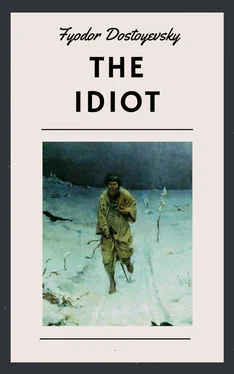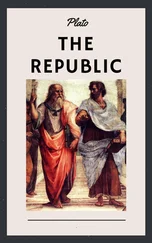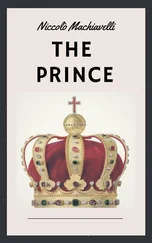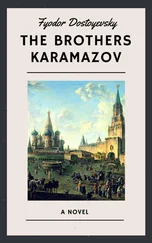Nastasia listened to all this with great interest; but the conversation soon turned to Rogojin and his visit, and this theme proved of the greatest attraction to both Totski and the general.
Ptitsin was able to afford some particulars as to Rogojin’s conduct since the afternoon. He declared that he had been busy finding money for the latter ever since, and up to nine o’clock, Rogojin having declared that he must absolutely have a hundred thousand roubles by the evening. He added that Rogojin was drunk, of course; but that he thought the money would be forthcoming, for the excited and intoxicated rapture of the fellow impelled him to give any interest or premium that was asked of him, and there were several others engaged in beating up the money, also.
All this news was received by the company with somewhat gloomy interest. Nastasia was silent, and would not say what she thought about it. Gania was equally uncommunicative. The general seemed the most anxious of all, and decidedly uneasy. The present of pearls which he had prepared with so much joy in the morning had been accepted but coldly, and Nastasia had smiled rather disagreeably as she took it from him. Ferdishenko was the only person present in good spirits.
Totski himself, who had the reputation of being a capital talker, and was usually the life and soul of these entertainments, was as silent as any on this occasion, and sat in a state of, for him, most uncommon perturbation.
The rest of the guests (an old tutor or schoolmaster, goodness knows why invited; a young man, very timid, and shy and silent; a rather loud woman of about forty, apparently an actress; and a very pretty, well-dressed German lady who hardly said a word all the evening) not only had no gift for enlivening the proceedings, but hardly knew what to say for themselves when addressed. Under these circumstances the arrival of the prince came almost as a godsend.
The announcement of his name gave rise to some surprise and to some smiles, especially when it became evident, from Nastasia’s astonished look, that she had not thought of inviting him. But her astonishment once over, Nastasia showed such satisfaction that all prepared to greet the prince with cordial smiles of welcome.
“Of course,” remarked General Epanchin, “he does this out of pure innocence. It’s a little dangerous, perhaps, to encourage this sort of freedom; but it is rather a good thing that he has arrived just at this moment. He may enliven us a little with his originalities.”
“Especially as he asked himself,” said Ferdishenko.
“What’s that got to do with it?” asked the general, who loathed Ferdishenko.
“Why, he must pay toll for his entrance,” explained the latter.
“H’m! Prince Muishkin is not Ferdishenko,” said the general, impatiently. This worthy gentleman could never quite reconcile himself to the idea of meeting Ferdishenko in society, and on an equal footing.
“Oh general, spare Ferdishenko!” replied the other, smiling. “I have special privileges.”
“What do you mean by special privileges?”
“Once before I had the honour of stating them to the company. I will repeat the explanation to-day for your excellency’s benefit. You see, excellency, all the world is witty and clever except myself. I am neither. As a kind of compensation I am allowed to tell the truth, for it is a well-known fact that only stupid people tell ‘the truth.’ Added to this, I am a spiteful man, just because I am not clever. If I am offended or injured I bear it quite patiently until the man injuring me meets with some misfortune. Then I remember, and take my revenge. I return the injury sevenfold, as Ivan Petrovitch Ptitsin says. (Of course he never does so himself.) Excellency, no doubt you recollect Kryloff’s fable, ‘The Lion and the Ass’? Well now, that’s you and I. That fable was written precisely for us.”
“You seem to be talking nonsense again, Ferdishenko,” growled the general.
“What is the matter, excellency? I know how to keep my place. When I said just now that we, you and I, were the lion and the ass of Kryloff’s fable, of course it is understood that I take the role of the ass. Your excellency is the lion of which the fable remarks:
‘A mighty lion, terror of the woods,
Was shorn of his great prowess by old age.’
And I, your excellency, am the ass.”
“I am of your opinion on that last point,” said Ivan Fedorovitch, with ill-concealed irritation.
All this was no doubt extremely coarse, and moreover it was premeditated, but after all Ferdishenko had persuaded everyone to accept him as a buffoon.
“If I am admitted and tolerated here,” he had said one day, “it is simply because I talk in this way. How can anyone possibly receive such a man as I am? I quite understand. Now, could I, a Ferdishenko, be allowed to sit shoulder to shoulder with a clever man like Afanasy Ivanovitch? There is one explanation, only one. I am given the position because it is so entirely inconceivable!”
But these vulgarities seemed to please Nastasia Philipovna, although too often they were both rude and offensive. Those who wished to go to her house were forced to put up with Ferdishenko. Possibly the latter was not mistaken in imagining that he was received simply in order to annoy Totski, who disliked him extremely. Gania also was often made the butt of the jester’s sarcasms, who used this method of keeping in Nastasia Philipovna’s good graces.
“The prince will begin by singing us a fashionable ditty,” remarked Ferdishenko, and looked at the mistress of the house, to see what she would say.
“I don’t think so, Ferdishenko; please be quiet,” answered Nastasia Philipovna dryly.
“A-ah! if he is to be under special patronage, I withdraw my claws.”
But Nastasia Philipovna had now risen and advanced to meet the prince.
“I was so sorry to have forgotten to ask you to come, when I saw you,” she said, “and I am delighted to be able to thank you personally now, and to express my pleasure at your resolution.”
So saying she gazed into his eyes, longing to see whether she could make any guess as to the explanation of his motive in coming to her house. The prince would very likely have made some reply to her kind words, but he was so dazzled by her appearance that he could not speak.
Nastasia noticed this with satisfaction. She was in full dress this evening; and her appearance was certainly calculated to impress all beholders. She took his hand and led him towards her other guests. But just before they reached the drawing-room door, the prince stopped her, and hurriedly and in great agitation whispered to her:
“You are altogether perfection; even your pallor and thinness are perfect; one could not wish you otherwise. I did so wish to come and see you. I—forgive me, please—”
“Don’t apologize,” said Nastasia, laughing; “you spoil the whole originality of the thing. I think what they say about you must be true, that you are so original.—So you think me perfection, do you?”
“Yes.”
“H’m! Well, you may be a good reader of riddles but you are wrong there , at all events. I’ll remind you of this, tonight.”
Nastasia introduced the prince to her guests, to most of whom he was already known.
Totski immediately made some amiable remark. All seemed to brighten up at once, and the conversation became general. Nastasia made the prince sit down next to herself.
“Dear me, there’s nothing so very curious about the prince dropping in, after all,” remarked Ferdishenko.
“It’s quite a clear case,” said the hitherto silent Gania. “I have watched the prince almost all day, ever since the moment when he first saw Nastasia Philipovna’s portrait, at General Epanchin’s. I remember thinking at the time what I am now pretty sure of; and what, I may say in passing, the prince confessed to myself.”
Читать дальше












